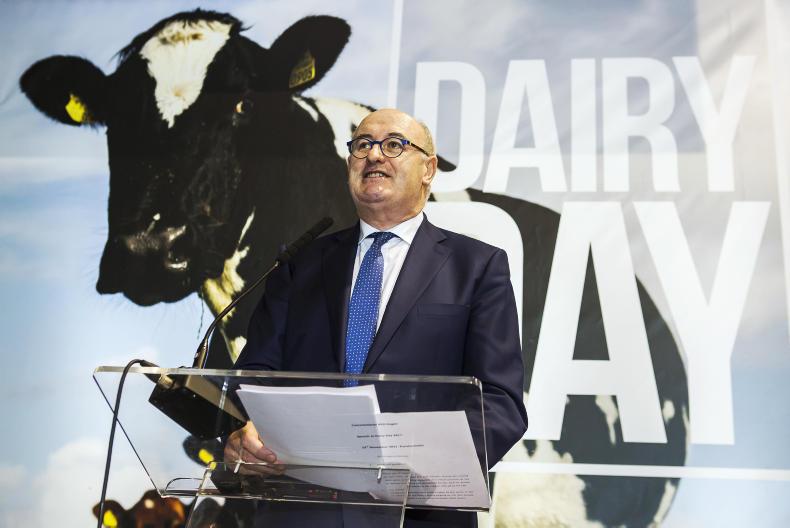The environmental challenge is not going away, and all agri-food sectors need to rise to the challenge, including dairy, the European Commissioner for Agriculture Phil Hogan has said.
Speaking at the Irish Farmers Journal Dairy Day on Thursday, he said in the next week’s communication on the future of the Common Agricultural Policy (CAP), he will propose a new model for results delivery.
This will combine strong environmental and climate targets at EU level with maximum flexibility at national level for how to get the job done, he said.
“The two-pillar approach will be retained but member states will define targets and devise a mixture of mandatory and voluntary measures in Pillar I and Pillar II.”
The granting of income support to farmers will be conditioned to their undertaking of environmental and climate practices.
“In this way, the CAP would make a much higher contribution to our environment and climate ambition.”
Top-down approach
Commissioner Hogan said that all of this reflects one of the key lessons we have learned from the 2013 reform: the real enemy of results-based performance – particularly environmental performance – is trying to enforce a "one size fits all", top-down approach.
“The environmental challenge is not going away, and all agri-food sectors need to rise to the challenge, including dairy. Let us not forget the risks of failing to do so.
“The Dutch dairy industry has been dealing with a phosphate problem for the past 12 months which resulted in the slaughter of 50,000 cows.
“They are currently negotiating their derogation under the Nitrates Directive – a derogation which is worth up to €1bn to the Dutch dairy industry.
“In recent weeks it has been revealed that controls need to be tightened, which places enormous pressure on the Dutch government.”
In Ireland, the Commissioner said the dairy sector is increasingly operating on a sustainable footing, working under the Nitrates Directive and the Water Framework Directive.
“I urge you to stay on this footing, because we know what happens when you fail to do so.”
Food chain
The Commissioner outlined how he has made the food chain a policy priority.
“In particular, I want to ensure that farmers receive a fair chunk of the value of their product.
“Retail supermarket dominance is a real problem in many EU member states, including this one. In Ireland, five supermarkets or discount businesses control over 90% of the grocery market.
“Therefore, an operator who fails to have his product listed with three of these five groups will struggle to maintain a feasible business.
“Meanwhile, own-label market share for liquid milk has increased from just under 40% in 2007 to over 80% currently.”
Ask yourself this: would the manufacturers of the smartphones in your pocket allow their products to be sold at half the price?
“We know how this situation came about. In 2006, based on strong support from the Competition Authority and the Department of Enterprise, the Groceries Order was abolished.
“I was shadow spokesman and I opposed this move, which was intended to liberate supermarkets from the supposed straitjacket that was the ban on below-cost selling and other fair trade concerns.
“There was to be dancing in the streets and everyday low prices.”
The reality is that food producers and processors now had to support supermarkets, Commissioner Hogan said.
He said we now know that this was happening because a leading supermarket was found to be using these payments to exaggerate profit levels.
“I read a report in last week's Farmers Journal highlighting the reluctance of the Irish retail industry to increase the price of butter notwithstanding the fact that the commodity price of butter more than doubled this year.”
He then proceeded to highlight how France face a similar dilemma earlier this year, where they failed to negotiate conditions with retail to better reflect the price evolution.
As a result, the French processors prioritised other customers instead of retailers, resulting in empty shelves of butter.
“A European food chain with this type of dysfunctionality is not sustainable. We need to act, and we need to do so now.
“The Commission will publish a proposal designed to tackle the imbalance of power and unfair trading practices.
“To get this proposal over the line, a strong political campaign from stakeholders will be required, and everybody in this room has skin in the game.”
Dairy Day: 'time to shut down the bullshit' - National Dairy Council
Dairy sector needs to manage problem of overproduction - Hogan






 This is a subscriber-only article
This is a subscriber-only article










SHARING OPTIONS: